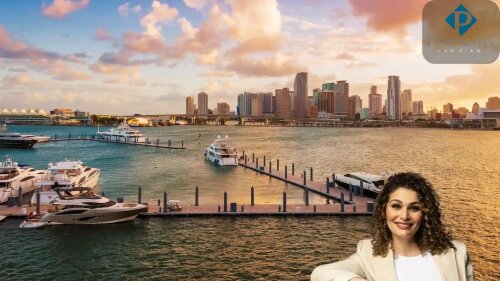Best Licensing Lawyers in Florida
Share your needs with us, get contacted by law firms.
Free. Takes 2 min.
Or refine your search by selecting a city:
List of the best lawyers in Florida, United States
United States Licensing Legal Questions answered by Lawyers
Browse our 1 legal question about Licensing in United States and read the lawyer answers, or ask your own questions for free.
- How do I legally protect my idea before selling or licensing it to a company?
- I have a makeup product idea that I want to sell or license, not the product itself. It is influenced by a product that was recently launched. Therefore, I want to sell/license to the company that launched said product. After some research, I contacted a patent attorney who explained that... Read more →
-
Lawyer answer by P.O OHIKHENA & Co
Good day,A patent will not be applicable since it's still an idea. You can go into an MOU(Memorandum of understanding) with the said company and also an NDA.You can contact me for my insight. Visit our profile and send us...
Read full answer
About Licensing Law in Florida, United States
Licensing law in Florida governs the process through which individuals and businesses obtain permission from the state or local authorities to engage in specific professions, trades, or activities. These laws ensure that practitioners meet certain standards intended to protect public health, safety, and welfare. Licensing varies widely depending on the field, whether professional occupations such as doctors, lawyers, and contractors, or business operations like selling alcohol or running childcare facilities. The Florida Department of Business and Professional Regulation (DBPR) and other state agencies administer many of these licenses, while some local governments have their own additional requirements.
Why You May Need a Lawyer
People often encounter complex legal or procedural challenges related to licensing in Florida. Common situations where you might need a lawyer include:
- Application Denials: If your license application is denied or delayed, a lawyer can help you understand and appeal the decision.
- Disciplinary Actions: Facing suspension or revocation of a license due to alleged violations or complaints may require legal defense.
- Compliance Questions: If you are unsure about rules or compliance requirements for obtaining or renewing a license.
- Background Issues: Past criminal records or financial concerns can complicate licensing, and legal advice can help navigate these obstacles.
- Business Expansion: If you wish to expand services or operations and need to know which additional licenses are required.
- Legal Interpretation: Understanding how changing laws may affect your licensure status or obligations.
- Hearing Representation: If a hearing before a licensing board or regulatory agency is scheduled.
Local Laws Overview
Licensing requirements in Florida depend on the type of activity or profession, as well as the location. Key aspects to consider include:
- State vs. Local Licensing: Many licenses are regulated at the state level, but some, such as business tax receipts (also known as occupational licenses), may be required by county or city governments in addition to state licenses.
- Professional Licenses: Professions such as real estate, cosmetology, contracting, and healthcare have standardized state-wide licensing administered by specific boards and agencies.
- Background Checks: Many licenses require applicants to undergo fingerprint-based background screening.
- Renewals and Continuing Education: Most professional licenses require periodic renewal and completion of continuing education credits.
- Disciplinary Actions: Regulatory agencies have the authority to investigate complaints, conduct hearings, and impose sanctions.
- Specialty Licenses: Certain activities, such as alcohol sales, firearms dealing, or operating childcare centers, require special permits or regulatory approval.
- Public Access to Records: Licensing records are often public, including disciplinary histories, which can impact reputation and employment opportunities.
Frequently Asked Questions
What types of activities or professions require a license in Florida?
Florida requires licenses for a wide range of activities and professions, including real estate agents, contractors, doctors, nurses, barbers, cosmetologists, teachers, attorneys, alcohol vendors, and childcare providers, among others.
How do I find out which license I need for my business?
You should consult the Florida Department of Business and Professional Regulation or your local county or city government to determine the specific licenses and permits required for your industry and location.
How long does it take to get a professional license in Florida?
Processing times vary widely by license type and completeness of your application. Some licenses may be obtained in a few weeks, while others may take several months, especially those requiring background checks or board approval.
What happens if I operate without a required license?
Operating without a proper license in Florida can result in fines, penalties, business closure, or criminal charges. It may also affect your future eligibility for licensure.
Can I appeal a license denial or disciplinary action?
Yes, most licensing agencies provide processes for appeal or review. You may be able to request a formal hearing and benefit from legal representation during the process.
Is my Florida professional license valid in other states?
Not necessarily. Each state has its own licensing requirements, though some professions have reciprocity agreements or compact licenses that allow for practice across state lines.
Do I need to renew my license, and how often?
Most licenses in Florida must be renewed periodically, often every one or two years. Renewal usually requires payment of a fee and completion of continuing education credits.
Are criminal records a barrier to obtaining a license?
A criminal record can impact eligibility for some licenses but does not automatically disqualify you. Many agencies consider the nature, severity, and recency of the offense.
What is a business tax receipt, and do I need one?
A business tax receipt, formerly known as an occupational license, is typically required by local governments for anyone engaging in business activities. It is separate from state professional licenses.
Where can I check the status or disciplinary history of a Florida-issued license?
Most regulatory agencies, such as the DBPR, provide online search tools for checking license statuses and any disciplinary actions on their official websites.
Additional Resources
Individuals seeking more information about licensing in Florida can consult:
- Florida Department of Business and Professional Regulation (DBPR) - Oversees licensing for many professions and businesses.
- Florida Department of Health - Handles healthcare practitioner licensing.
- Florida Department of Agriculture and Consumer Services - Licenses activities such as security, food service, and agriculture.
- Division of Alcoholic Beverages and Tobacco - Regulates alcohol and tobacco licenses.
- Local County and City Government Offices - Issue business tax receipts and local permits.
- Florida Bar Lawyer Referral Service - Connects individuals with attorneys experienced in licensing law.
Next Steps
If you are facing a licensing legal issue or need guidance, take these steps:
- Determine the specific license or permit you need by consulting the relevant state or local agency.
- Carefully review application instructions and gather all necessary documentation.
- If you receive a denial, notice of investigation, or other adverse action, promptly seek legal advice.
- Contact a lawyer experienced in Florida licensing law for an initial consultation to review your case.
- Maintain records of all communications and documents related to your licensing matter.
- Use official resources to verify license status and requirements to stay compliant with regulations.
Understanding the licensing process in Florida can be challenging, but utilizing available resources and consulting with knowledgeable legal professionals can help protect your interests and support your goals.
Lawzana helps you find the best lawyers and law firms in Florida through a curated and pre-screened list of qualified legal professionals. Our platform offers rankings and detailed profiles of attorneys and law firms, allowing you to compare based on practice areas, including Licensing, experience, and client feedback.
Each profile includes a description of the firm's areas of practice, client reviews, team members and partners, year of establishment, spoken languages, office locations, contact information, social media presence, and any published articles or resources. Most firms on our platform speak English and are experienced in both local and international legal matters.
Get a quote from top-rated law firms in Florida, United States — quickly, securely, and without unnecessary hassle.
Disclaimer:
The information provided on this page is for general informational purposes only and does not constitute legal advice. While we strive to ensure the accuracy and relevance of the content, legal information may change over time, and interpretations of the law can vary. You should always consult with a qualified legal professional for advice specific to your situation.
We disclaim all liability for actions taken or not taken based on the content of this page. If you believe any information is incorrect or outdated, please contact us, and we will review and update it where appropriate.
Browse licensing law firms by city in Florida
Refine your search by selecting a city.















